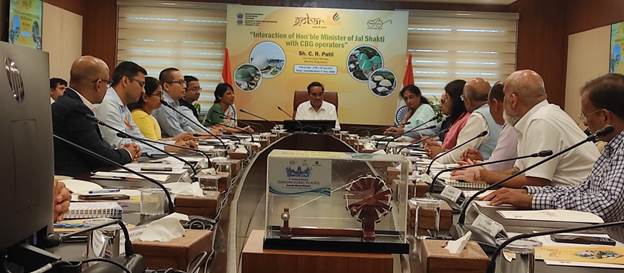In a significant step to review progress and gather feedback on the progress of the GOBARdhan Initiative, Union Minister for Jal Shakti Shri C. R. Paatil, in New Delhi today, interacted with Compressed Biogas (CBG) producers and key stakeholders of the sector. The meeting signifies the importance the Government attaches to the GOBARdhan initiative, which is aimed at transforming organic waste into valuable resources such as CBG and organic manure.

The event saw participation from multiple key stakeholders, including representatives from the various stakeholder Ministries/Departments, CBG operators and leading organizations in the sector. This interaction aimed to strengthen collaboration and address the challenges faced by CBG producers, demonstrating the government’s unwavering support for innovative and sustainable waste management solutions.
Addressing the gathering, Shri Paatil thanked Prime Minister Shri Narendra Modi for his vision in conceptualising the GOBARdhan initiative, which embodies Government’s commitment to sustainable development and circular economy. The Minister further added, “By converting organic waste into valuable resources, we are not only protecting our environment but also generating employment and promoting health and wellbeing. Our government is dedicated to supporting and advancing this crucial sector to achieve India’s long-term environmental goals.”
During the interaction, CBG operators shared their challenges with the Minister, particularly highlighting the excessive use of chemical fertilizers and the lack of a well-defined mechanism for promoting the system of trading in carbon credits in the CBG sector in the country. The CBG industry talked about the excessive use of chemical fertilizers specifically drawing attention to the deficiency of carbon in the soil and the role of FOM (Fermented Organic Manure)/ LFOM (Liquid Fermented Organic Manure) in restoring this carbon balance. They suggested that by promoting bio-fertilizers, this degradation in soil health could be restored. Accordingly, they requested for more Farmer Educational programmes in this regard as well as to look into the possibility of bundling fertilizers. The industry talked about the carbon credit system as being a substantial revenue earner for the sector and requested the Government to quickly establish mechanisms so that this fledgling sector could be further incentivized. This would not only support India’s vision of achieving net zero but also enhance the economic viability of these projects.
The CBG industry appreciated the substantial work done in the sector by the Government and pointed out to the increasing number of people/entities who are now willing to enter this sector. They pointed out that the announcement in the Union Budget 2023-24 to establish 500 new waste-to-wealth plants was a major shot in the arm for GOBARdhan. In furtherance of the same, presently 113 CBG plants are functional, with 667 plants in various stages of development and 171 plants under construction. There has been an impressive year on year growth in number of CBG units over the past few years, from only 19 functional CBG plants in 2020 to 113 functional CBG plants currently. Various policy enablers have been implemented to ensure the viability and growth of these plants, promoting a circular economy and sustainable development.
In the end, the Minister thanked the CBG stakeholders for their inputs and assured the gathering that the Government would ensure that this sector would develop and soon become a sunrise sector for the economy.
Key Initiatives & Highlights of the GOBARdhan Initiative:
- Market Development Assistance (MDA) of D/o Fertilisers promotes organic fertilizers by providing financial support of Rs. 1500/MT for sale of FOM/LFOM produced from GOBARdhan plants
- Financial Assistance Schemes of M/o Petroleum and Natural Gas supports development of pipeline infrastructure for injection of CBG in city gas distribution networks at an upper ceiling of Rs. 28.75 Cr/ Project.
They also facilitate the procurement of biomass aggregation machinery at a maximum financial assistance of 50% of procurement cost of the biomass machinery.
Financial assistance of Rs 1.8 crore per 4 tonne/day (TPD) CBG capacity project with a capping of Rs 9 crore per project on pro-rata basis.
SATAT Scheme provides offtake of CBG by Oil Marketing Companies (OMCs) at an assured price of Rs.54/ Kg + GST.
The Excise Duty Exemption for CBG blended in Compressed Natural Gas (CNG) prevents double taxation.
The CBG blending Obligation (CBO) of CBG blending in CNG (Transport) and PNG (Domestic) initiated with an annual target that is kept at 1 %, 3% and 4% of total CNG/PNG consumption for FY 2025- 26, 2026-27 and 2027-28 respectively.
- M/o New and Renewable Energy’s Waste to Energy programme provides central financial assistance for BioCNG projects at maximum CFA of Rs 10 crore/project.
- D/o Agriculture and Farmers Welfare ensured standardization and inclusion of bioslurry in the Fertilizer Control Order. The Agri-Infra Fund (AIF) provides 3% per interest subvention on loans up to Rs. 2 cr. for setting up of CBG plants.
- Indian Council for Agricultural Research has facilitated development of Package of Practices (PoP) for FOM/LFOM application for various crops.
- M/o Housing and Urban Affairs offers central assistance of 25%/33%/50% (based on ULB population) with a maximum cap of Rs.18 crore per 100 TPD feedstock.
- D/o Drinking Water and Sanitation’s Unified Registration Portal has streamlined efforts for one to avail benefits of any of the CBG schemes of Government of India. They have launched a Unified Registration Portal for CBG/Biogas plants (https://gobardhan.co.in).
 Matribhumi Samachar English
Matribhumi Samachar English


